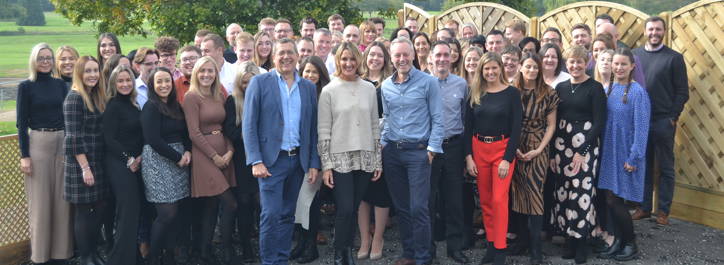Gender diversity is critical to your firm's bottom line
Research on gender diversity is frequently covered by the business press and it is fast becoming clear that this is not a women’s issue, it is a business issue.
The benefits reaped by gender-diverse companies are backed up by a Leeds University study, which reveals that having at least one female director on the board can reduce the risk of going bust by 20%. And according to the strategic management consulting firm, McKinsey & Company, financial results improve when at least 30% of boards or senior management is made up of women.
Mixed boards also tend to be more collaborative and creative when it comes to problem solving; they make better decisions and consider how a business issue could impact people as well as the bottom line.
At Pure we strive to lead the way in promoting how essential women are to business success in our region. For instance, we recently ran seminars for male and female CEOs, COOs, CFOs and HR directors in Cambridge, Ipswich, Chelmsford and Norwich, to stimulate discussion about how we can achieve a better gender balance at board level and to understand what is happening in our region. And with progress in recruiting women at board level stalling, according to this year’s Cranfield Female FTSE Board Report, such encouragement is essential.
The same report warns that the target of one in four women on FTSE 100 boards by 2015 may be at risk (figures out last week showed it was down to just three). It also shows that in the six months running up to March 2013, previous headway in getting more female representation on FTSE boards had slowed down, triggering concern over EU quotas.
Consequently, FTSE companies are being urged to promptly regain their momentum in addressing the imbalance.
Although organisations can do a lot to challenge and improve the status quo, women are being strongly encouraged to take ownership of their own careers and help turn around this situation. But what are the barriers blocking their way into the senior recruitment pipeline and how can they overcome them?
A concern emerging from Pure’s recent seminars is a lack of confidence commonly felt by women, causing many to hold themselves back without knowing it. Women need to conquer self-doubt arising from complications such as juggling family and work.
Of course, it is common for careers to plateau after having children because it certainly is not easy. But for women who do continue to progress at work, it can be extremely rewarding and worthwhile.
However, until corporate culture and attitudes change to be more inclusive, women need to concentrate on pushing themselves forward a lot more.
Here in Cambridge we are fortunate to be part of a diverse and multicultural business environment where women are doing relatively well in middle to senior management posts in finance, HR and marketing. In fact, out of the 22 candidates Pure appointed to financial controller positions in Cambridge over the last year, 14 were women.
This is a very encouraging sign and we will continue to monitor how many of these women continue to progress to CFO roles in the next five years.
It is outside of these disciplines and in some of the more male dominated industries that women really do need to take action to advance their careers and support each other.
They can do it through:
Leadership training programmes – Women can boost their self-esteem and develop skills required for senior management roles by signing up to recognised courses. Training can also inspire women to speak up, network and self-promote, helping them to get noticed.
Mentoring – Another highly effective way for women to develop key skills is by teaming up with business professionals who have already trodden the path to senior management. The mentor-mentee relationship has a tremendously empowering effect when women get support and guidance and are acknowledged as having potential. Combined with the weight of a mentors’ expectations women are driven forward in their work.
Online networking – Using social media is ideal for women who cannot meet face-to-face with other female professionals. In fact, on the back of our seminars Pure has set up the new ‘Achieving Gender Balance at Board Level’ LinkedIn group to engage women to learn, debate, share knowledge and encourage others to aim high.
Spotting opportunities in growth industries – Women need to think about what they can contribute to Cambridge’s thriving industries that are traditionally male-dominated such as hi-tech, biomedicine and green energy. By moving into these sectors women can contribute key skills and leave a legacy for other women.
Helping young women – It is never too early to aim high; from the outset female graduates need to show commitment, drive and an eagerness to learn. The job market might be highly competitive these days, but there is still significant demand for candidates with the right attitude.
Young women also need to be encouraged to pursue careers in our region’s growth sectors.
Beating fear – Employers are increasingly looking for the kind of women who would make excellent senior decision-makers. So female job applicants must be prepared to demonstrate enthusiasm, ability and a thirst for knowledge, and promote their achievements.
Job sharing after maternity leave – This could replace the more common part-time arrangement. Typically, job sharing is more prevalent at administrative level and we rarely see good examples in senior management. But one case that does stand out is a job share at Marks & Spencer; two women shared a senior marketing role so successfully they were promoted on the basis of demonstrating that their approach provided better value to the employer.
If job sharing is not available in many workplaces at the moment, perhaps women can help develop it and prove it works.
I’d like to encourage anyone who wants to join the current debate on women in the workplace to find the ‘Achieving Gender Balance at Board Level’ group on LinkedIn. Also, Cambridge News readers are welcome to contact Pure about our current discussions with ‘Her Invitation’, a company dedicated to supporting women in leadership positions, to run a programme for future, high-potential female leaders in Cambridge.



